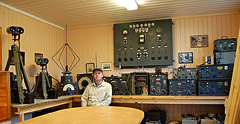 |
LA6NCA |
 |
 |
LA6NCA |
 |
MAMMUT
RADAR STATION AT BLAAVANN IN DENMARK

Here we see the Mammut bunker from Blåvand lighthouse.
The sea is seen in the background.

The entrance to the bunker.

NW side of the bunker. Here we see the northern cable shaft.
Half the antenna cables went down here.

SW side of the bunker. Here we see the southern cable shaft.
The cables of the other half of the antenna went down here.

South side of the bunker.

Here is the northern cable shaft and two of the four antenna
masts.

Here is the southern cable shaft and the other two antenna masts.

The top of the cable shaft.

Here half of the thick coax cables came down to the radar
equipment.

Here we see the holes where the cables were mounted. Seen from
the cable shaft.

Seen from the inside of the bunker.

The cable from the northern part of the antenna.
This is the Kompensator room.
The wall to the Betreibs raum has fallen down partly.

Northern cable entry.

Furthermore, in Northern cable entry.

Entire Radar room.

Set from the radar room towards the entrance.

Parts of the antenna are located in the sand outside the bunker.
Photos forom the Mammut page;

Here is a sketch showing all the cables from the antenna that
goes down to the compensator.
The compensator allows the fixed antenna can change direction
horizontally.

A great picture of an antenna.

Here is the radar equipment in Blaavand 1945.
This is the equipment that was in the same room as the pictures
above.

R618SK
in Arendal, Norway

| This bunker is a communications
bunker hidden in the woods at Hove on Trommøya at
Arendal. It was probably built by Russian prisoners of war in 1943. There were few or no Norwegians who knew to it during the war. After the war it was also unknown to all but neighbors and military personnel who worked with it. Its existence was kept secret and allied intelligence had not plotted it on their maps. The bunker was probably telephone exchange for the HF coaxial cable from Norway to Germany via Hirtshals in Denmark. |

Kristen Taraldsen tells and
shows the construction of the R618 in Arendal.

| 1 - Antenna room. 2 - Radio room. 3 - Communication room?? 4 - Boiler room. 5 - Telephone Cable entry to the bunker. 6 - Telephone Switches room?? 7 - Telex room, bedroom. 8 people. 8 - Chief bedroom and office. 9 - Storage. 10 - Power Station. 11 - Shooting Position against intruders approaching the entrances. 12 - Entrance. |

Inngangs-døren til bunkersen.

Trond Erik Tveit, Flemming Christiansen and Kristen Taraldsen in
the bunker.

From the communications room. Kristen Taraldsen and Trond Erik
Tveit examining room.

From the boiler room.

| The bunkers have 100 incoming
telephone lines. Two large telephone Exchanges were in use here. |

Kristen
Taraldsen ser på overspenningsvern
på linjene som kommer inn til bunkeren.

Kabell innføring til bunkeren.

Place the antenna mast. The antenna wind up through a hole in the
ceiling. 12 such are built in the bunker.
Only 2 were in use. The bunker had only two radios.

Connection box for coaxial cable to the antenna. Coaxial cable to
the radio room 2

Antenna box at the top of the bunker. The antenna was probably a
vertical antenna at approx. 7 to 10 meters.
The antenna can be hoisted into the bunker via a gas-tight
casing.
We
would like more information about this bunker.
Want information on the bunkers to the general staff in Arendal,
too.
FREYA

SBSF had a tour to a FREYA installation south vest from OSLO in
Norway.

This FREYA house is now used for police and fire communication
equipments.

LA4LN, Tom Victor Segalstad show the drawing of the installation.

This is 68 years old.

Cables and some ruins after hoses are in the area round the
FREYA.

I have found the top cover for the antenna.
One of the members of the SBSF shows the cover.

And here,
I have found the FREYA antenna.